
 Despite loads of young-French-blonde nudity courtesy of then-newcomer nymph Ludivine Sagnier, François Ozon’s Swimming Pool is merely a decent movie. It’s a virtually thrill-less thriller (purposely methodical, one assumes) about a lonely mystery writer with writer’s block (Charlotte Rampling) who goes to her publisher’s summer home in France to get her creative juices flowing.
Despite loads of young-French-blonde nudity courtesy of then-newcomer nymph Ludivine Sagnier, François Ozon’s Swimming Pool is merely a decent movie. It’s a virtually thrill-less thriller (purposely methodical, one assumes) about a lonely mystery writer with writer’s block (Charlotte Rampling) who goes to her publisher’s summer home in France to get her creative juices flowing.
It works until his highly promiscuous daughter (Sagnier) shows up and keeps the woman up all night with her loud orgasms. Then the girl kills someone and the writer doesn’t seem to mind because it’s good plot fodder. Then, in an effort to keep the crime covered up for the sake of the book, she beds an old sweaty gardener just after he’s mowed the yard. Eeewww!
 The film is nicely shot, and I didn’t dislike it, but the ending left me with a “that’s it?” feeling. If you rent the unrated version, you get to see the girl blowing a French guy while Rampling throws rocks at them.
The film is nicely shot, and I didn’t dislike it, but the ending left me with a “that’s it?” feeling. If you rent the unrated version, you get to see the girl blowing a French guy while Rampling throws rocks at them.
WARNING: But if you rent the unrated version, you also get full-frontal scraggly Rampling. WARNING: No matter which version you rent, you have to see a sleazy, dumpy French guy hanging out of his black cotton underwear. —Rod Lott

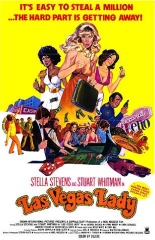
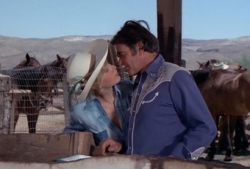 It’s a not-so-ritzy joint where the entertainment isn’t Goth magicians, killer tigers or stick-up-the-ass Billboard divas, but a chintzy circus act starring three busty trapeze artists, one of whom is sick of all the flying around. Lucky corrals her (Linda Scruggs) and a token black woman (Lynne Moody,
It’s a not-so-ritzy joint where the entertainment isn’t Goth magicians, killer tigers or stick-up-the-ass Billboard divas, but a chintzy circus act starring three busty trapeze artists, one of whom is sick of all the flying around. Lucky corrals her (Linda Scruggs) and a token black woman (Lynne Moody, 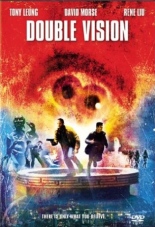
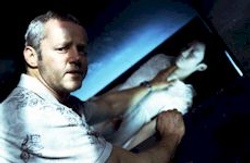 The reveal of the killer proves to be anticlimactic, but then the film makes up for it by throwing a huge, steel-plated monkey wrench into the plot that really shakes things up – something I would never expect. The last act isn’t as good as the setup since the focus shifts from suspenseful to spiritual, but Chen Kuo Fu’s film as a whole is extremely well-crafted and anchored by two solid leads. —Rod Lott
The reveal of the killer proves to be anticlimactic, but then the film makes up for it by throwing a huge, steel-plated monkey wrench into the plot that really shakes things up – something I would never expect. The last act isn’t as good as the setup since the focus shifts from suspenseful to spiritual, but Chen Kuo Fu’s film as a whole is extremely well-crafted and anchored by two solid leads. —Rod Lott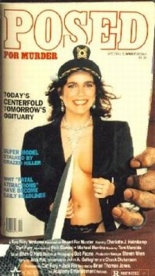
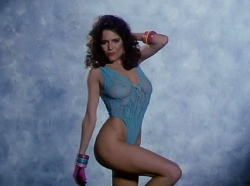 Charlotte Helmkamp (Miss December 1982) is clearly cast against type as Laura, a hot brunette with a bangin’ body whose photos in the low-rent Thrill have paid the bills, but who longs for the kind of respect that’s synonymous with being a terrible actress in low-budget horror films. While she pursues her dream in-between workouts and photo shoots, she barely has the time to notice that all of the people around her are turning up kinda dead.
Charlotte Helmkamp (Miss December 1982) is clearly cast against type as Laura, a hot brunette with a bangin’ body whose photos in the low-rent Thrill have paid the bills, but who longs for the kind of respect that’s synonymous with being a terrible actress in low-budget horror films. While she pursues her dream in-between workouts and photo shoots, she barely has the time to notice that all of the people around her are turning up kinda dead. 
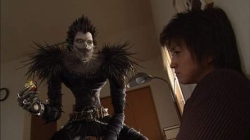 After the police get nowhere — and lose a lot of their own men in the process — they lean on the candy-addicted, hermit/genius known only as L (Ken’ichi Matsuyama of
After the police get nowhere — and lose a lot of their own men in the process — they lean on the candy-addicted, hermit/genius known only as L (Ken’ichi Matsuyama of